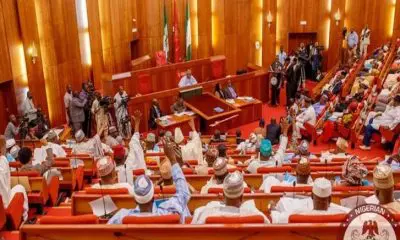Lawyers Drag Senators to Court Over Salaries for Non-Performance

Because of their claimed poor performance, legislative lawyers working under the Association of Legislative Drafting and Advocacy Practitioners (ALDRAP) have started to demand that senators from Nigeria pay back a portion of the income and benefits they have been receiving since 2023.
In addition, a group of 40 senators are being asked to refund all of the compensation and benefits they got while serving concurrently in the Nigerian Senate and the ECOWAS and Pan-African parliaments, which is against Nigerian law.
The legislative attorneys have sent a pre-action warning to the Senate, addressed to Senate President Godswill Akpabio, after contacting the Federal Competition and Consumer Protection Tribunal as consumers who were unhappy with the senators’ services.
The respondent in a lawsuit is first served with a pre-action notice before being called to appear before the Federal Competition and Consumer Protection Tribunal, in compliance with its rules.
In a letter dated May 26, 2025, ALDRAP’s Administrative Secretary, Amuga Jesse Williams, signed the pre-action notification.
The letter is named “Pre-action Notice: Demand made pursuant to the Federal Competition and Consumer Protection Commission Act, 2018 for the reimbursement of 78% of the total salaries and allowances received by each of the 109 senators from May 2023 to May 2025 for 12% performance and fulfillment of their statutory responsibilities to constituents (consumers) and reimbursement of all salaries and allowances received by the 40 senators who neglected their duties at the National Assembly to serve as legislators in the Pan-African Parliament and the Parliament of the Economic Community of West African States (ECOWAS), respectively. This is in violation of Section 68 of the Federal Republic of Nigeria, 1999 Constitution, which forbids senators from serving concurrently in both the National Assembly and another legislative body.
Included in the correspondence were the President of the Federal Republic of Nigeria, the Chief Justice of Nigeria, the Executive Vice-Chairman of the Federal Competition and Consumer Protection Commission, the Central Bank of Nigeria Governor, the Accountant-General of the Federation, the Secretary-General of the ECOWAS Parliament, and the Secretary-General of the Pan-African Parliament.
Since the start of the 10th National Assembly in May 2023, the Senate has only performed 12 percent of its duties, according to the legislative counsel, who cite available statistics.
In light of this, they are asking the Federal Competition and Consumer Protection Tribunal to order the senators to pay back to the national treasury, through the Accountant-General of the Federation, 78% of the salaries and benefits they received between May 2023 and May 2025 for providing insufficient service.
“As a professional association of legislative lawyers, the Association of Legislative Drafting and Advocacy Practitioners, or ALDRAP, encourages legislators and other members of the legislative ecosystem to adhere to the provisions of the Nigerian Constitution,” the letter stated. We enforce compliance through public interest lawsuits and public education.
In this letter, we have sworn to an affidavit of facts to back up our claims. It is enclosed or bound up. As representatives of the Federal Republic of Nigeria’s 109 senators, we speak for the constituents, or consumers, of the legislative services that they provide.
“We, the constituents and consumers, write to make the following demands under the Federal Competition and Consumer Protection Commission Act, 2018 because we are dissatisfied with the legislative services rendered by the aforementioned 109 senators:
“Refund 78% of the total salaries and benefits received by each of the 109 senators of the Federal Republic of Nigeria’s Senate since May 2023 to the present (each senator receiving ₦15,000,000 per month).”
“All salaries and allowances received by the 40 senators who serve in the Pan-African Parliament and the ECOWAS Parliament, respectively, amount to ₦15,000,000 per sitting for a minimum of 10 sessions annually.”
We will have no choice but to file a lawsuit against you before the Federal Competition and Consumer Protection Tribunal in line with the applicable laws if you do not comply within seven days of the date of this letter.
Sections 6 and 14 of the Nigerian Constitution, Section 130 of the Administration of Criminal Justice Act (ACJA), 2015, and Sections 69 and 104 of the Federal Competition and Consumer Protection Act, 2018 all contributed to the suit’s public interest, according to the attorneys’ affidavit, which was filed on May 27, 2025, and deposed to by Jesse Amuga.
“The subject matter of this suit relates to the performance or otherwise of statutory duties imposed on the 109 senators of the Federal Republic of Nigeria according to sections 4, 88, and 89 of the Constitution of the Federal Republic of Nigeria, 1999 (as amended), which include lawmaking, oversight, and effective representation,” the affidavit said.
“The 10th Senate of the Federal Republic of Nigeria engaged in a legislative pattern and conduct from June 2023 to May 2025 that amounts to failure and neglect of the statutory duties for which they have solicited public funds through salaries and allowances, thus unfairly enriching themselves at the expense of the public.”
In his Open Letter to the Senate President, Senator Godswill Obot Akpabio, and the Majority Leader, Senator Michael Opeyemi Bamidele, dated May 26, 2025, Dr. Tonye Clinton Jaja, a specialist in legislative law and legal drafting with 21 years of professional legal experience, provided the empirical findings and observations that I rely on. In his letter, Dr. Jaja emphasized, among other things, the following specifics and real-world examples of legislative failure:
A. The 10th Senate passed a number of executive bills, such as the National Anthem Act of 2024 and the Bill for Extension of the Tenure of the Inspector-General of Police, in less than a week without holding public hearings or conducting thorough review.
B. The Senate allegedly passed a law on March 20, 2025, endorsing the declaration of a state of emergency in Rivers State without following Section 305 of the 1999 Constitution, which calls for a two-thirds majority vote. C. Only 5.4% of the 475 bills examined since 2023 that were examined by the Order Paper Parliamentary Monitoring Group addressed security, and only 7.3% dealt with agricultural and food security, which are the two most important issues facing the Nigerian people.
D. In violation of their oversight and representative responsibilities, the 10th Senate prioritized approving executive-sponsored laws over private member bills and matters of public interest.
As per the Daily Post’s alleged acquisition of the document, the National Assembly Committees on Constitutional Review have consistently received ₦5 billion since 2011. Some people have requested that they return this money when it was claimed that Senator Ike Ekweremadu, who was the Senate Committee on Constitutional Review’s chairman at the time, had spent more than ₦8 billion of it. It is selective and at odds with the Senate’s actual legislative record for Senator Michael Opeyemi Bamidele to claim that due diligence was applied to the 2025 Budget and that 39 discussions were had with the Executive before to approving the Tax Reform Bills.
“The Senate is not expected to check the Executive arm of government, as stated by Senate President Godswill Akpabio, who publicly stated that senators were not elected to “fight” the Executive. This is a fundamental violation of the legislative oversight duty and the doctrine of separation of powers. One member, Senator Natasha Akpoti-Uduaghan, has been the target of harsh and excessive confrontational action by this same Senate, which includes: (a) an unlawful six-month suspension that goes beyond what is allowed by Senate Rules and court precedent. (a) She was the target of a number of lawsuits, public relations campaigns, and suspected criminal charges.
“The Senate’s institutional duty as an independent branch of government is blatantly neglected by this uneven use of legislative authority—aggression toward a fellow lawmaker but submissiveness to the Executive. The senators of the 10th Assembly have violated the value-for-money principle by inadequately fulfilling their constitutionally mandated duties of lawmaking, oversight, and constituent representation while collecting salaries and allowances. As a result, they must return 78% of the salaries and allowances they received between June 2023 and May 2025.
Read Also: Tinubu Seeks Approval to Borrow S21.5bn, E2.1bn, and Y15bn for National Projects
Along with the aforementioned, a number of National Assembly members violated Section 68(1)(a) of the Constitution, which forbids sitting lawmakers from holding any other office of profit or emolument, by accepting appointments and being sworn in as members of the Pan-African Parliament and the ECOWAS Parliament in April 2024 while still serving as Nigerian lawmakers.
In the affidavit, the legislative attorneys further mentioned that the senators in question have been enjoying wages, benefits, and privileges as members of Nigeria’s National Assembly while also taking part in legislative business inside ECOWAS or Pan-African organizations.
“This dual occupancy and compensation from both offices violates the principle of legislative accountability and integrity and is in violation of the Constitution.”
The association argued that the continued abuse of legislative power would continue to hurt Nigerian citizens if the court did not order the appropriate authorities to look into and start the process of recovering the salary and allowances paid, as well as to disqualify lawmakers who were not eligible.
They insisted that the court “grants the reliefs sought in this suit” because doing so is essential to justice and public trust.
According to a report released in October 2024 by OrderPaper, Nigeria’s premier independent parliamentary monitoring organization, more than half of the bills that were introduced in the Senate between June 2023 and May 2024 were duplicates of those from previous assemblies, especially the 9th Assembly.
According to the report, about one-third of the bills discussed in the House of Representatives during that same period were reintroduced from the previous session.
The results showed that there was a significant discrepancy between Bills’ advancement and sponsorship. Only 19 of the 475 bills that the Senate offered between June 2023 and May 2024 were passed, according to an analysis by OrderPaper.
As bills related to agriculture and food security made up only 5.8% of House Bills and 7.3% of Senate Bills, the performance report again highlighted a lack of attention to important national issues. Security-related bills accounted for 7.2% of House bills and 5.4% of Senate bills.
The report noted that “bills addressing these issues remain few, with many not progressing past the first reading,” despite the enormous challenges that residents in these sectors have encountered in recent years.
The 10th Senate introduced 464 bills in its first year, from May 2023 to May 2024, but only 19 of them were passed, according to the documents that are currently available.
Of the 341 bills introduced in the second year, which ran from May 2024 to May 2025, just seven were carried. By December 2024, just 114 of the 1,727 bills submitted to the House of Representatives had been passed.





